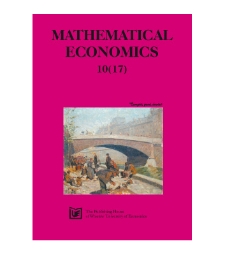Dolnośląska Biblioteka Cyfrowa udostępnia 109 612 obiektów cyfrowych
Obiekt
Tytuł: On maximal social preference
Autor:
Opis:
Mathematical Economics, 2014, Nr 10 (17), s. 33-52
Abstrakt:
Wydawca:
Wydawnictwo Uniwersytetu Ekonomicznego we Wrocławiu
Miejsce wydania:
Data wydania:
Typ zasobu:
Identyfikator zasobu:
doi:10.15611/me.2014.10.03 ; oai:dbc.wroc.pl:29268
Język:
Powiązania:
Mathematical Economics, 2014, Nr 10 (17)
Prawa:
Wszystkie prawa zastrzeżone (Copyright)
Prawa dostępu:
Dla wszystkich w zakresie dozwolonego użytku
Lokalizacja oryginału:
Kolekcje, do których przypisany jest obiekt:
- Dolnośląska Biblioteka Cyfrowa > Uczestnicy Konsorcjum > 04. Uniwersytet Ekonomiczny we Wrocławiu > Czasopisma wydawane przez Wydawnictwo UEW > Mathematical Economics
- Dolnośląska Biblioteka Cyfrowa > Zasoby > 2. Czasopisma > Czasopisma współczesne
Data ostatniej modyfikacji:
17 paź 2019
Data dodania obiektu:
27 sie 2015
Liczba wyświetleń treści obiektu:
332
Wszystkie dostępne wersje tego obiektu:
https://dlibra.kdm.wcss.pl/publication/32724
Wyświetl opis w formacie RDF:
Wyświetl opis w formacie OAI-PMH:
| Nazwa wydania | Data |
|---|---|
| On maximal social preference | 17 paź 2019 |
Obiekty Podobne
Maciuk, Arkadiusz Smoluk, Antoni
Łyko, Janusz
Łyko, Janusz
























